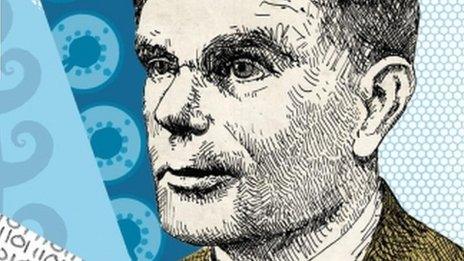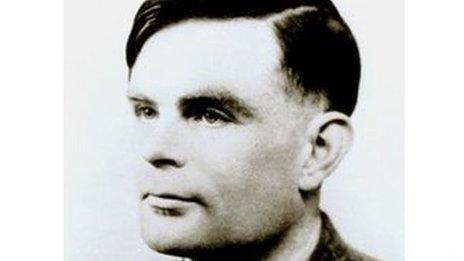Alan Turing Institute to be set up to research big data
- Published

The centenary of Turing's birth was marked in June 2012
An institute named after computer pioneer and code-breaker Alan Turing is to be set up, the chancellor announced in his Budget speech on Wednesday.
The Alan Turing Institute will focus on new ways of collecting, organising and analysing large sets of data - commonly known as big data.
The government will provide £42m over five years for the project.
Universities and other interested parties will be able to bid for the funding to set up the institute.
Turing received a posthumous royal pardon last year, following a conviction for homosexual activity.
He worked at Bletchley Park during World War Two, and his work helped accelerate Allied efforts to read German naval messages enciphered with the Enigma machine.
He also contributed some more fundamental work on code-breaking, which was only released to public scrutiny in April 2012.
In 1952 he was convicted for gross indecency, following which he was chemically castrated.
He had been arrested after having an affair with a 19-year-old Manchester man.
The conviction meant he lost his security clearance and had to stop the code-cracking work that had proved vital to the Allies in World War Two.
A pardon was granted in December 2013 under the royal prerogative of mercy after a request by Justice Minister Chris Grayling.
Britain leads
Delivering his Budget speech in the House of Commons, the Chancellor, George Osborne, said: "In my maiden speech here in this House, I spoke of Alan Turing, the code-breaker who lived in my constituency, who did more than almost any other single person to win the war, and who was persecuted for his sexuality by the country he helped save.
"I am delighted that he has finally received a posthumous royal pardon.
"Now, in his honour, we will found the Alan Turing Institute to ensure Britain leads the way again in the use of big data and algorithm research.
"I am determined that our country is going to out-compete, out-smart and out-do the rest of the world."
The government said that big data "can allow businesses to enhance their manufacturing processes, target their marketing better, and provide more efficient services".
The think tank Policy Exchange said that the institute was a good idea but government needed to make more use of big data itself.
- Published24 December 2013

- Published8 January 2014

- Published24 December 2013
